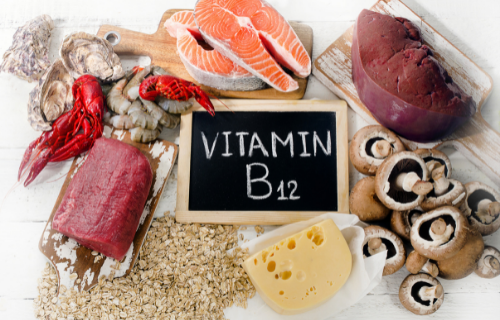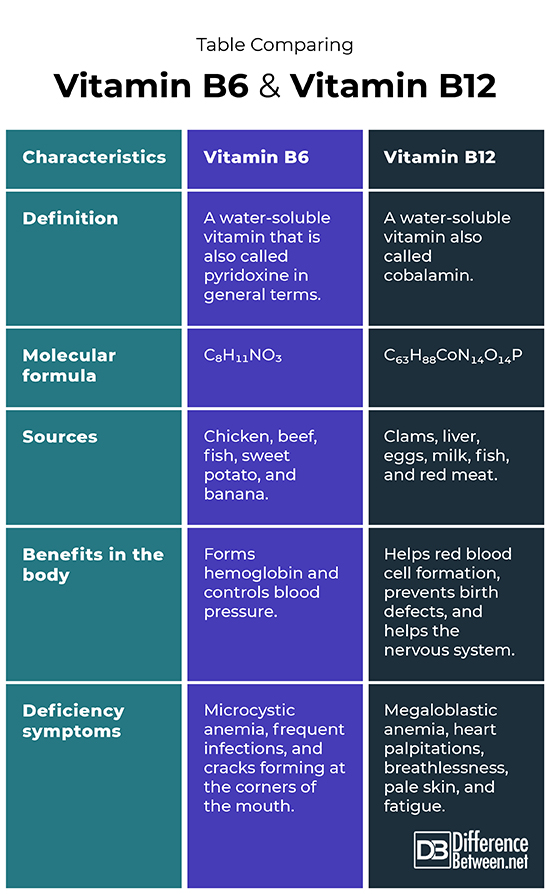Difference Between Vitamin B6 and Vitamin B12
Vitamin B6 is a vitamin also occasionally called pyridoxine. Vitamin B12 is a B vitamin often called cobalamin.

What is Vitamin B6?
Definition:
Vitamin B6 is a water-soluble vitamin also sometimes known as pyridoxine.
Chemical structure and types:
The molecular formula of vitamin B6 is C₈H₁₁NO₃. The vitamin occurs in three forms, namely, pyridoxamine, pyridoxine, and pyridoxal.
Functions:
Vitamin B6 in coenzyme form, after converting into pyridoxal 5’-phosphate, functions in many cellular reactions, including those involved in carbohydrate and amino acid metabolism.
Health benefits:
Pyridoxine is important in controlling homocysteine, which helps keep the heart healthy. Vitamin B6 also helps form heme, a part of hemoglobin, which is how we carry oxygen in the blood. This vitamin is also helpful for people with high blood pressure in helping to lower the systolic and diastolic pressures to healthier levels.
Natural sources:
Good animal-based dietary sources of vitamin B6 include chicken, fish, and beef. Plant sources of vitamin B6 include pistachios, avocado, sweet potato, and banana.
Supplements and fortification:
You can find vitamin B6 supplements which contain the vitamin in the form of pyridoxine hydrochloride. Food such as rice or flour is also sometimes fortified with vitamin B6 but this varies from country to country.
Deficiency symptoms:
Frequent illnesses can result because a lack of vitamin B6 has a negative impact on the immune system and how it functions. Signs of vitamin B6 deficiency include microcystic anemia and cracks forming at the corners of the mouth.

What is Vitamin B12?
Definition:
Vitamin B12 is a water-soluble B vitamin commonly known as cobalamin.
Chemical structure and types:
Vitamin B12 occurs in two forms, namely, cobalamin and cyanocobalamin. The molecular formula for vitamin B12 is C63H88CoN14O14P.
Functions:
Vitamin B12 helps make DNA molecules, and is important in forming myelin, a protective layer that surrounds nerve cells. It is also needed to make red blood cells and keeps homocysteine levels under control.
Health benefits:
Getting enough vitamin B12 is important because it helps prevent anemia, which can cause you to feel tired and weak. It also helps keep your nervous system functioning properly. It is important for pregnant woman to take in enough vitamin B12 to reduce the chances of neural birth defects. It is also thought that this vitamin helps to improve mood.
Natural sources:
The only natural sources of vitamin B12 are animal-based products like milk, eggs, fish, and red meat, liver, and clams.
Supplements and fortification:
Supplements of B12 usually are in the form of cyanocobalamin. A doctor can also give an injection of B12, which is important if a person has problems absorbing the vitamin in the stomach. Sometimes vitamin B12 is added to breakfast cereals, soy, and yeasts, which is helpful for people who do not eat meat or dairy products.
Deficiency symptoms:
Deficiency of vitamin B12 has signs like feeling breathless, being tired and weak; these are signs of megaloblastic anemia. There may be heart palpitations and the skin may be pale in color, hands and feet may tingle because the nerves are affected by a lack of vitamin B12.
Difference between Vitamin B6 and Vitamin B12
Definition
Vitamin B6 is a water-soluble vitamin commonly called pyridoxine. Vitamin B12 is a water-soluble vitamin also called cobalamin.
Molecular formula
The molecular formula of vitamin B6 is C₈H₁₁NO₃. The molecular formula of vitamin B12 is C63H88CoN14O14P.
Sources
Chicken, beef, fish, sweet potato, and banana are sources of vitamin B6. Clams, liver, diary products, fish, and meat are sources of vitamin B12.
Benefits in the body
Vitamin B6 is beneficial in forming hemoglobin and in helping blood pressure. Vitamin B12 is helpful in nervous system and cardiovascular system function.
Deficiency symptoms
Microcytic anemia and cracked lips indicate a lack of vitamin B6. Megaloblastic anemia shows a lack of vitamin B12.
Table comparing Vitamin B6 and Vitamin B12

Summary of Vitamin B6 and Vitamin B12
- Vitamin B6 and B12 are both water-soluble vitamins that are important for good health.
- Vitamin B6 helps keep the cardiovascular system healthy.
- Vitamin B12 helps in red blood cell formation and in keeping the nervous system in top shape.
FAQ
Which is better to take B12 or B6?
Both vitamin B12 and B6 are equally important in the body; however, people who do not eat meat may specifically need B12 supplements since the main source of the nutrient is animal products.
Is B12 B complex the same as B6?
A B12 B complex is not the same as B6 because it also includes vitamin B12. A B complex usually includes all of the needed B vitamins.
Can I take vitamin B6 and B12 together?
You can take both vitamin B6 and B12 together and it may be useful to take all your B vitamins at the same time with a meal to help with absorption and also to reduce nausea, which may occur if you take these on an empty stomach.
What does vitamin B6 and B12 do?
Vitamin B6 is important in many cellular reactions and B12 helps to form red blood cells and helps nerve function.
- Difference Between Rumination and Regurgitation - June 13, 2024
- Difference Between Pyelectasis and Hydronephrosis - June 4, 2024
- Difference Between Cellulitis and Erysipelas - June 1, 2024
Search DifferenceBetween.net :
Leave a Response
References :
[0]Grant, William B., et al. "Evidence that Vitamin B12 supplementation could reduce risk of influenza and COVID-19 infections and deaths." Nutrients 12.4 (2020): 988.
[1]Harvard T.H. Chan School of Public Health. “B vitamins”. The President and Fellows of Harvard College, 2021, https://www.hsph.harvard.edu/nutritionsource/vitamins/vitamin-b/
[2]Li, Fei, David Watkins, and David S. Rosenblatt. "Vitamin B12 and birth defects." Molecular genetics and metabolism 98.1-2 (2009): 166-172.
